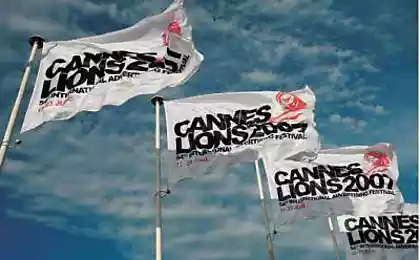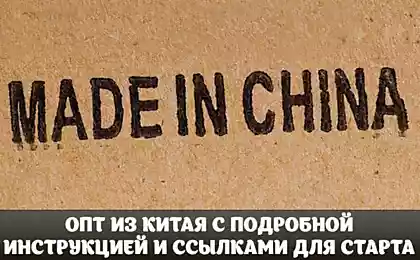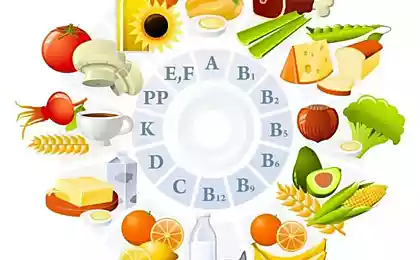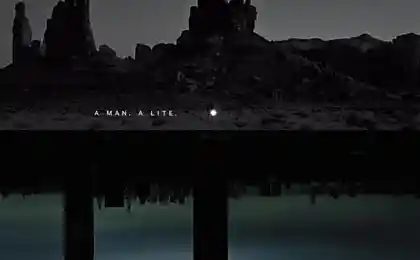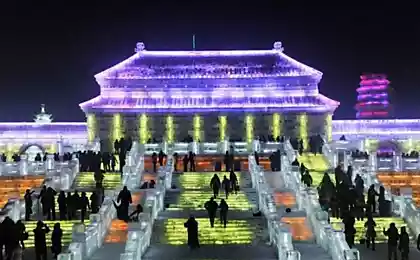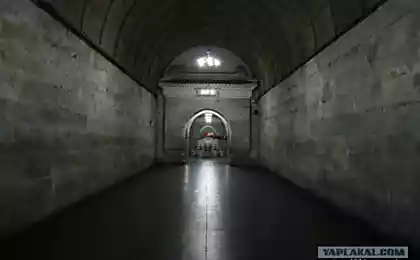554
During the Lantern Festival, Chinese men are poured hot iron
Unforgettable zrelischeEzhegodno during the Lantern Festival in the Chinese village Nuankuan passes one of the most memorable fireworks show in the world. This tradition is called Yes Shuhua (in Chinese "tree flower"). And in order to keep its experienced blacksmiths "take a shower" of molten iron.
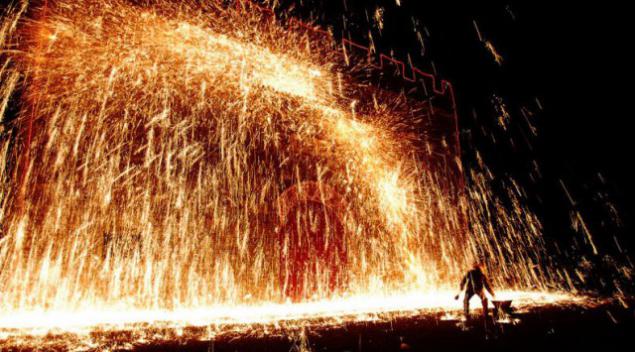
It is believed that Yes Shuhua originated over 300 years ago, when the local blacksmiths have come up with a unique alternative to fireworks. Wealthy people have always celebrated the New Year by using fire crackers, but this poor blacksmiths could not afford. So they had to rely on themselves, and look for a cheaper alternative. Inspired by the forging process, blacksmiths began to melt iron at a temperature of about 1000 ° C, and then splashed it melt into a large stone wall to create the effect of fireworks. Upon contact with the cold stone melt iron to create beautiful flowers, which then drops rain on the brave blacksmiths. The effect was so stunning that Yes Shuhua gradually became more popular fire crackers and people have started to bring different scrap for holiday melt.
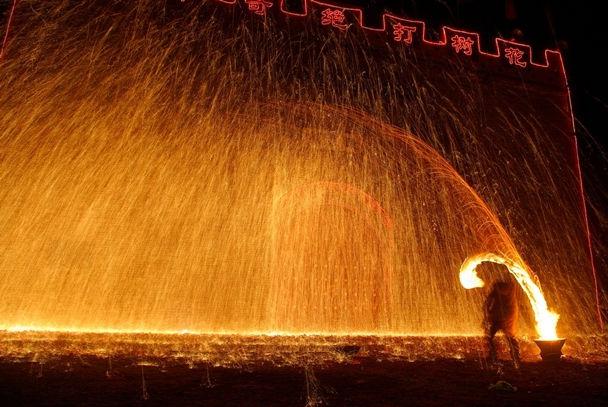
Soon the fireworks from the molten iron become a tradition in Nuankuan and even gave rise to a popular local saying: "The rich are playing with fire crackers, and poor performing Shuhua Yes." In recent years, the celebration has become more spectacular as blacksmiths began experimenting with other metals such as aluminum and copper, creating with their help green and white "flowers" instead of the usual red.
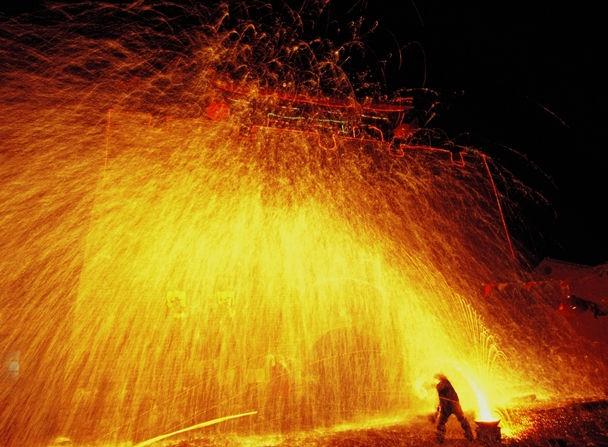
Performed Yes Shuhua, usually in the evening. Metals are melted in a furnace, the resulting melt is poured into special containers at the base of the city wall, built in the ancient style. The length of the wall 30 meters, height - 10 meters. Performers dressed in a thick protective clothing made of sheep skin and straw hats, stirred molten iron wooden buckets, wetted in water.
The thickness of these buckets only two centimeters, but as soon as they come into contact with the hot metal surface it will char, and the thin layer does not allow the bucket to burn during mixing. At the end of the festival interested viewers are going to buy these buckets for their collections.
After melt properly mixed, blacksmiths begin to splash it on a high stone wall, and it explodes spectacular sea sparks.
The molten iron pouring rain at the man stuns the audience. However, it is dangerous for the life of the artist. The use of modern means of individual protection recently discussed, but in the end it was decided by them to give up for the sake of respect for tradition. Surprisingly, while Shuhua Yes, no one has ever died or even got severe burns, due mainly to the ability and experience of performers.
Today, in the province of Wei Xian there are only four artist Shuhua Yes, three of them for 40 years, but judging by the popularity of this fiery tradition, they will be able to find among the young receivers to transmit their knowledge and preserve the tradition. Spend Yes Shuhua on the 15th day of the New Year holidays.
via www.odditycentral.com/events/men-shower-themselves-with-molten-iron-during-fiery-chinese-celebration.html

It is believed that Yes Shuhua originated over 300 years ago, when the local blacksmiths have come up with a unique alternative to fireworks. Wealthy people have always celebrated the New Year by using fire crackers, but this poor blacksmiths could not afford. So they had to rely on themselves, and look for a cheaper alternative. Inspired by the forging process, blacksmiths began to melt iron at a temperature of about 1000 ° C, and then splashed it melt into a large stone wall to create the effect of fireworks. Upon contact with the cold stone melt iron to create beautiful flowers, which then drops rain on the brave blacksmiths. The effect was so stunning that Yes Shuhua gradually became more popular fire crackers and people have started to bring different scrap for holiday melt.

Soon the fireworks from the molten iron become a tradition in Nuankuan and even gave rise to a popular local saying: "The rich are playing with fire crackers, and poor performing Shuhua Yes." In recent years, the celebration has become more spectacular as blacksmiths began experimenting with other metals such as aluminum and copper, creating with their help green and white "flowers" instead of the usual red.

Performed Yes Shuhua, usually in the evening. Metals are melted in a furnace, the resulting melt is poured into special containers at the base of the city wall, built in the ancient style. The length of the wall 30 meters, height - 10 meters. Performers dressed in a thick protective clothing made of sheep skin and straw hats, stirred molten iron wooden buckets, wetted in water.
The thickness of these buckets only two centimeters, but as soon as they come into contact with the hot metal surface it will char, and the thin layer does not allow the bucket to burn during mixing. At the end of the festival interested viewers are going to buy these buckets for their collections.
After melt properly mixed, blacksmiths begin to splash it on a high stone wall, and it explodes spectacular sea sparks.
The molten iron pouring rain at the man stuns the audience. However, it is dangerous for the life of the artist. The use of modern means of individual protection recently discussed, but in the end it was decided by them to give up for the sake of respect for tradition. Surprisingly, while Shuhua Yes, no one has ever died or even got severe burns, due mainly to the ability and experience of performers.
Today, in the province of Wei Xian there are only four artist Shuhua Yes, three of them for 40 years, but judging by the popularity of this fiery tradition, they will be able to find among the young receivers to transmit their knowledge and preserve the tradition. Spend Yes Shuhua on the 15th day of the New Year holidays.
via www.odditycentral.com/events/men-shower-themselves-with-molten-iron-during-fiery-chinese-celebration.html
"Yikes!" The story of how Nassim Taleb has made the inevitable disaster in the investment strategy
In France, supermarkets are obliged to give unsold food to charities



